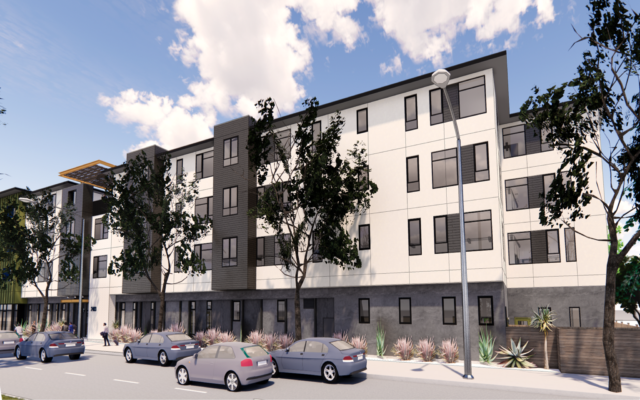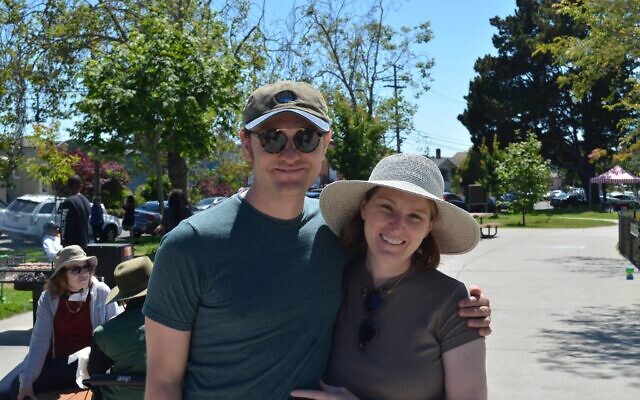When Berkley Moshav breaks ground next year it will be the realization of a vision that began 8 years ago in a living room in California. But, for Berkeley Moshav’s founder, Roger Studley, the dream goes back even further.
“This idea of Jewish communal living has been with me for as long as I can remember. As Jews, it’s so innate in us to want to live communally and multi-generationally. We want Berkeley Moshav to be a place where families with kids, people without kids, and folks of all ages can all really enjoy the benefits of living in a shared environment.” Studley said.
Members Mike Gast and Rachel Dodson are excited to raise their son in this shared Jewish environment. For members like Ellen Reier who are already familiar with communal living, the benefits are clear.
“I miss the spontaneous opportunities for socializing that were available to me when I lived communally, and that’s what I’m most looking forward to when I move into Berkeley Moshav.” Reier said.
The project is well underway and will consist of 36 homes in a single building with ample shared space. Fourteen of the homes have already been reserved, with many more prospective residents currently considering joining.

A rendering of the future building of Berkeley Moshav.
Besides owning their own private, fully appointed residence, members of the Moshav will share access to a kosher communal kitchen, a rooftop terrace, a 5,000-square-foot outdoor courtyard, and 3,000 square feet of indoor space for amenities such as a kids’ play area and art/exercise space.
It is in this shared space where the magic of the moshav will happen.
“We all know how hard it is to raise kids on your own. Imagine having a whole village instead. You’ll have people to sit with your kids if you need to run out, to be mentors for them, to act as extra grandparents and aunts and uncles.” Studley said.
The draw of a multi-generational environment appeals to many families with young children. Future resident Noah Brod is particularly excited about the idea of his children growing up surrounded by a village, “We are looking for a place to raise a family, with other parents around,” Brod said. His experience living in a home with 14 people of different ages in the Peace Corps introduced him to the joys of communal living. “It’s a rich way to live your life,” Brod added.
While people of all faiths are welcome at the Moshav, residents will experience the benefits of living Jewish lives together.
“Part of our mission is to create a place where Judaism can be integrated into our daily lives. Let’s have neighbors that we can connect with in a Jewish context, whether it’s learning Hebrew together, or helping to educate our kids, or sharing a holiday or Shabbat meal.” Studley added.

Future Berkeley Moshav residents enjoying a communal event.
Living sustainably is another of the core values that will be reflected in Berkeley Moshav. Studley notes that having 36 households in one modern building will naturally reduce consumption of resources and energy, while increasing connections and relationships. Solar energy, shared transportation options, and communal meals will all be integral to sustainable living at the Moshav.
These shared meals will also be an important part of strengthening community ties. Two or three times a week, residents will collaborate to prepare meals for the entire building, with each member only required to join a cooking team once a month.
“Imagine coming home from work and having dinner ready for you and your neighbors and all the kids can just run around and play with each other in a safe, confined area while you enjoy good food and company.” Studley noted.
While each member owns their own home, decisions regarding communal spaces, activities, and logistics will be made using a non-hierarchical decision-making structure – designed for equivalence of voice, transparency, and efficiency – in which all residents can participate.
While Studley was inspired by the democratic and communal nature of intentional communities in Israel, his dream of communal living began in Berkeley.
“It was always going to start in Berkeley. Berkeley’s probably got more innovative Jewish infrastructure per capita than anywhere else in the country. We’ve got great public schools, a Jewish day school, outdoor Jewish education, the Jewish Studio project, a prestigious kosher winery, interaction between the different streams of Jewish life, the list just goes on and on. There are people from the full Jewish spectrum all coming together in one area.” Studley said.
Studley envisions the Moshav reflecting that same diversity and vibrancy of Jewish life in Berkeley, in a more intimate setting.
Once he gets this off the ground in Berkeley, Studley intends to use his nonprofit (Urban Moshav) to create similar communities in other places. “We’ve had these amazing innovations over the last hundred years in communication and transportation…. Meaning that we can live anywhere and work anywhere and stay connected. But somehow we’ve actually become less connected. The goal here is to recreate a Jewish neighborhood feel where people hang out together and are invested in each other so we all feel less alone.”
Future residents have been working together with their architect to design Berkeley Moshav’s homes and building. Construction is planned to begin in Spring 2024. Homes will be purchased at cost – there’s no markup – and prices, currently projected from 880,000 for a one-bedroom to $1.6 million for three-bedroom, are in line with the Berkeley market. Anyone interested in living in the community is invited to attend an information session (via Zoom) and spend 1-3 months as an “explorer,” getting to know the project and the current members.
For more information, visit Berkeley Moshav’s website.
To learn more about membership, check out their upcoming information sessions


